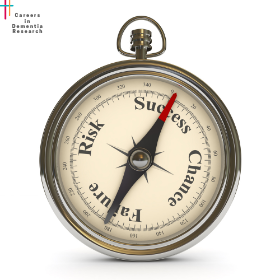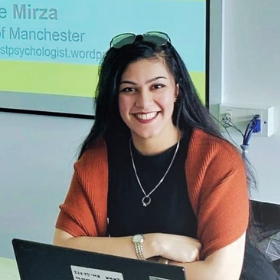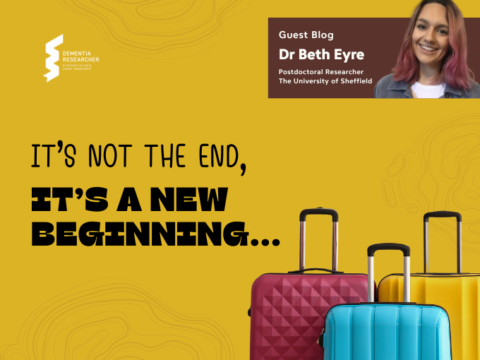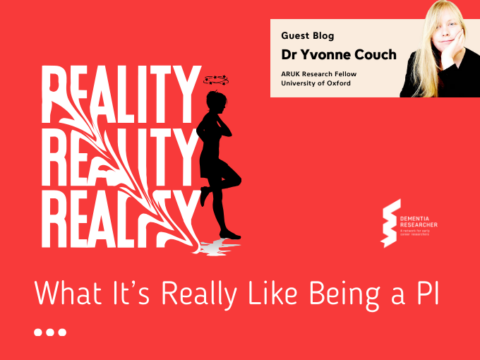I am a product of success.
My father championed in both sports and academics, and is now a very successful ophthalmologist. My mother boasts an even grander pedigree, overcoming childhood adversities to become a gold medalist. Two model first generation immigrants who took their hard earned gains back to their home country to give back. I grew up insulated by inspiring exemplars of success, hearing about my grandmother who started a business to drag her family out of poverty, my aunt who launched a second career in her forties writing novels and completing a PhD, my uncle who went from working in his garage to creating the company that put light bulbs in the White House.
Failure is something my family doesn’t know how to do. Then I came along.
I‘m an MRC funded postgraduate researcher at the University of Manchester, studying dementia diagnosis in ethnic minorities. I interact directly with service users of dementia services and their carers, exploring the cracks ethnic minorities are falling through and why. I’ve published, I’ve presented, I’ve won awards and scored funding for passion projects. By all accounts I should be deemed a success, impermeable to the disappointing stench of failure. Truthfully, I’ve been steadfastly failing upwards since 2008.

Four F’s didn’t stop Nadine going on to studying an MPhil
From growing up in a vacuum of achievement I was suddenly made aware of my shortcomings on the day I came home with four Fs. Reality set in when my friends and I all applied to the same university in Pakistan. I failed at that too and while Manchester was still a stellar prospect I remained overwhelmed by leaving everything familiar. Complemented by youthful ignorance and some ill timed health issues, I failed modules in my first and second year. Though I ended up graduating well, finally getting a grip on the reins in third year, it was not well enough to get on to the clinical psychology MSc I had planned for.
I don’t remember my graduation well because it’s eclipsed by the day after; tearfully reading another university rejection and having to once again say goodbye to what had become familiar. I remember weeks of the summer of 2015 paralyzed on my parents’ couch trying to figure out how to resurrect my career when I felt responsible for digging its grave. I look back on that moment as a catalyst. I didn’t know if a clinical psychology programme would take me anymore, which would mean the end of my profession as I had imagined it. And I’d been imagining it since I was 13. But I had no control over that anymore. It was time to go back to the drawing board and reimagine a career. Time to control what I could.
I joined a 4 month clinical placement meant for undergraduates at a government hospital in Pakistan. When I wasn’t working I studied at home and retrained on concepts and skills. All nighters returned. I frantically went down every rabbit hole looking for options to strengthen my background, so that one day people could look beyond my performance so far. I found the best option was to do a PhD, for which I would first need to do an MPhil. I asked for research work at my placement- my first true exposure to research in the field- and they let me collect data through depression questionnaires in a make shift bomb shelter turned outpatient ward. I sporadically contacted potential supervisors and began devising acceptable pitches with my limited but growing knowledge.
Neither dementia nor a research career were on my radar- I was simply looking for a means to an end to get on to the clinical psychology doctorate. When my current supervisor, a psychiatrist who champions the ethnic minority experience in mental health, agreed to a meeting with me, it was the first time the prospect of dementia was brought up. He was interested in the gaps of current cognitive tests used to diagnose dementia and how they were ill suited for non White, non English speaking populations. I didn’t know much about the journey, or much about dementia really, but I was up for the ride. And, somehow, he decided to give me a chance.

Researching cognitive testing in ethnic minorities & experience of dementia diagnosis & access to services in British South Asians
In 2016 one person’s belief in me went on to change the entire trajectory of my career and my life. The prodigal daughter returned to Manchester and the grueling load of the MPhil was some of the most strenuous and passionate work I’ve ever given myself up to. I conducted a systematic review and qualitative synthesis, collected data through questionnaires, focus groups and interviews, developed guidelines and an assessment, and wrote up a 300 page thesis on the translation and cultural adaptation of cognitive tests. It was more than a labour of love- it was a labour of desperation. An opportunity to rewrite the record. But this time I was aware of how to approach counselling, how to better manage my time and study habits, and of my own strengths and limitations. I was better used to living alone and doing everything for myself. I ended up finishing 3 months early and graduating with minor corrections and merit. My department was so pleased with my efforts it segwayed into a research assistant position and eventually into my funded PhD.
I remember my supervisor calling me into his office and showing me the application for MRC funding- this highly competitive scholarship for the top medical research candidates in the UK. My little MPhil and I were intimidated. Not just at how incredibly difficult this was going to be but also, if I was starting to stray away from my original intent of becoming a clinical psychologist. I had been so fixated on one end goal for so long I was afraid to pigeon hole myself further down the unfamiliar research route. I said “I don’t think I can do this”. He didn’t say I could. He said “You will”.
I have been doing that PhD on improving British South Asians access to dementia services, along with teaching, writing, clinical work, and supervising independent research projects, for nearly four years now. There was no cramming into the pigeon hole- quite the opposite. I became exposed to the multitude of opportunities I hadn’t realized existed for me, or that I was even capable of accessing. For so long I wasn’t aware that clinical psychologists can also be researchers and writers and policy makers and public engagers and business trainers- it wasn’t until my PhD that this was brought to my attention. I had been obsessed with clinical psychology but now that blind obsession was replaced with passion- and for multiple simultaneous avenues. I’m reshaping my career into a multi-disciplinary venture.
People ask me all the time how I arrived at the work I’m doing today. The honest answer is that I fell into it. There was no strategy, no five year plan. I had never intended to become so immersed in the experiences of dementia in South Asians, nor did I realise how much I would begin to genuinely care about and advocate for this work. Half way into my fourth year it’s just dawning on me how much knowledge I’ve absorbed, not just about dementia, but about the research world. And most of the time- through failures.
My papers from my MPhil were rejected multiple times before being accepted for publication and major revisions don’t phase me anymore- it made me a better writer. I was heavily critiqued in a 3 hour first-year viva with my manuscript sent back in the red but I learnt from each and every comment -it made me a critical researcher. I broke out into hives before my first oral presentation due to nerves so now I practice every talk I give multiple times – it made me an award winning speaker. I dropped out for 6 months because of medical leave and fell drastically behind- it made me flexible to the natural adversities of life that will interrupt and interfere with our successes.

Nadine made Manchester her home
Today I still have lofty aspirations to be a clinical and occupational psychologist, but I’m supplementing that with all the other transferable skills I’m learning. I’m applying my research skills and dementia knowledge to an independent research project centered around ethnic minorities access to neuropsychological services. I deliver training around research methods both in collaboration with organizations and independently as a way of sending down the ladder to others. And I brain storm little side research projects to build upon my work on cognitive testing in ethnic minorities, just so it doesn’t gather dust on the shelf.
I attribute all of this to my past failures, the ones I was so ashamed of facing, and how they conspired to put me on the path I’m on today. I no longer feel defined by those failures. They’re no longer the first thing people see about me, or even what I think about myself, when it comes to what I’m achieving in life. There was a time where I was haunted by my failures on a daily basis- now I’m able to constructively reflect on them. I have learnt what a privilege it is to be allowed to fail. And this is all the result of my supervisor being able to look past my failures on day one and effectively recognize it for what it was: learning.
This recognition is what academia- an entire world built around trial and error- should be nurturing. The failures are the ones who learn from their circumstances, who learn how to overcome those circumstances. The failures are the learners who, when things start to fall apart as many things do in life, will think outside the box to succeed. And more often than not, the failures are the ones who failed on an uneven playing field, who were failed by the rest of us. Who have probably learnt more than any of us can imagine through that failure. When academia doesn’t give a chance to those that fail, academia misses out on its biggest successors.
As I grow more confident in how my career is turning out I am aware there will be many who are in the position I was, who believe you need certain scores and a flashy portfolio of experience to make it anywhere in academia, and even anywhere in life. From someone who felt that strongly and unconditionally, I cannot tell you what a relief it was to realise that is not the case. There is no singular straight and narrow trail. There are always multifaceted approaches to an aspiring end goal but you have to be ready to do the work to find them- do the research, approach the experts, self study, stalk the blogs, make social media connections- be ready to think outside that box.
And as you work towards that end goal you might find yourself gravitating towards a new one. Don’t be afraid of changing your mind, or even your entire career. Don’t be afraid of the pigeon hole like I was- say yes to every opportunity that comes your way. Every single one. Because you won’t know what you’re great at till you try it all. And as you hone your skills start creating opportunities for yourself from scratch.
Above all, do not shy away from your failures. They’re not a dirty secret you need to hide. My successes weren’t born from the absence of failures; they were created by them.
I am a product of failure.
Author

Nadine Mirza
Nadine Mirza is a postgraduate researcher and research assistant based at the Centre for Primary Care and Health Services Research at the University of Manchester and also at Salford Royal NHS Foundation Trust. Her research explores cognitive testing in ethnic minorities and the experience of dementia diagnosis and access to dementia services in British South Asians. When I’m not doing research she loves writing about it, and it a keen science communicator.
How have you turned career your failures into successes? Reply in the box below

 Print This Post
Print This Post




